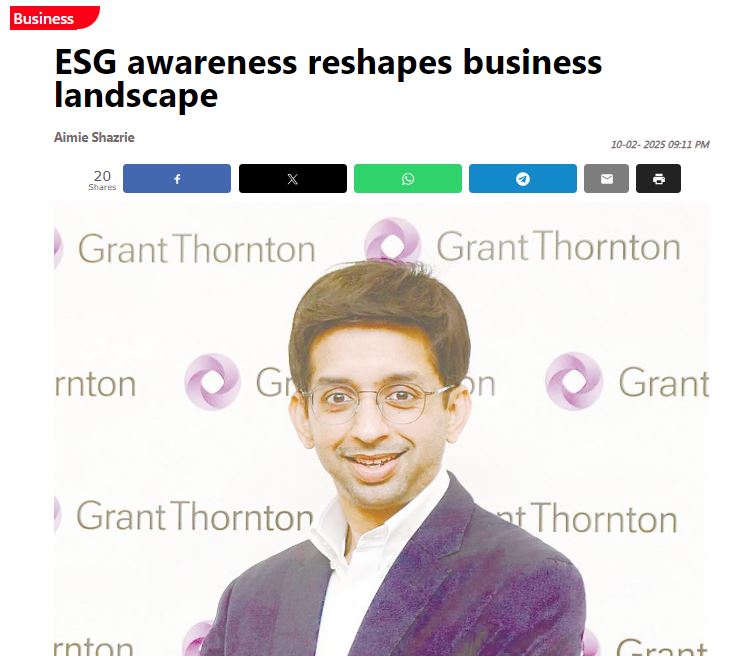As published on theSun, 10 February 2025
KUALA LUMPUR: As environmental, social, and governance (ESG) considerations gain momentum in Malaysia, businesses are increasingly recognising the importance of sustainability, ethical operations, and transparent governance.
Grant Thornton Malaysia country CEO Kishan Jasani (pic) said companies that fail to adapt to these changes risk reputational damage, regulatory scrutiny and operational inefficiencies.
He emphasised that human rights issues, particularly in labour-intensive industries, are becoming a significant concern.
“Businesses that neglect worker welfare not only face reputational risks but also struggle to attract and retain talent.
“With Malaysia already experiencing a labour shortage, we often advise companies to adopt fair labour practices, treating employees with dignity and respect to ensure long-term sustainability,” he told SunBiz.
To improve ESG disclosures, Kishan recommended that Malaysian businesses engage with industry peers, such as the Federation of Malaysian Manufacturers and the Malaysian Rubber Glove Manufacturers Association, to address ESG challenges collectively.
“Companies should also ensure compliance with regulatory guidelines like Bursa Malaysia’s reporting framework and international standards, aligning with evolving ESG expectations.
“Starting with basic indicators like gender diversity and resource usage, businesses can scale up their ESG initiatives over time.
“Additionally, investing in employee training on ESG reporting and compliance can reduce dependence on external consultants and foster a culture of sustainability within the company,” he remarked.
Addressing governance risks, he noted that corruption and bribery remain key governance risks in Malaysia’s corporate sector while highlighting the importance of whistleblowing policies.
“Auditors play a crucial role in identifying and reporting unethical practices to protect stakeholders and maintain corporate integrity,” Kishan emphasised.
Furthermore, he noted that the growing adoption of ESG principles among Malaysian SMEs is driven by increased awareness, affordable technology, and evolving regulatory frameworks.
“Businesses are utilising Internet of Things (IoT) solutions and data analytics to improve energy efficiency, while sustainable practices such as solar energy adoption and rainwater harvesting are gaining momentum.
On Malaysia’s ESG leadership in Asean, Kishan said, despite global uncertainties, Malaysia remains ahead of its regional peers in ESG adoption.
“With Asean’s growing commitment to sustainability, Grant Thornton foresees more companies integrating ESG strategies to enhance competitiveness, attract investors, and future-proof their operations,” he noted.
As Malaysian businesses navigate the evolving ESG landscape, Kishan said many are focusing on integrating sustainability into their core strategies.
“Companies are increasingly aligning their operations with the United Nations Sustainable Development Goals (SDGs), which help guide their efforts in areas such as responsible consumption, climate action, and decent work and economic growth.
“The rise of consumer demand for sustainable products and services is also compelling businesses to adopt eco-friendly practices.
“This shift towards sustainability not only enhances brand reputation but also positions companies to capitalise on emerging market opportunities within the green economy,” he said.
In parallel, he noted that financial institutions are playing a crucial role in driving the ESG agenda forward in Malaysia.
“Banks and investors are increasingly considering ESG factors when making funding decisions, promoting responsible business practices among firms seeking capital.
“The growing availability of green finance, such as sustainability-linked loans and green bonds, is further accelerating the transition to sustainable business models,” he added.
Kishan said, as the regulatory and investment landscape evolves, Malaysian businesses are positioned to leverage these developments and enhance their competitiveness in both local and international markets, contributing to the country’s overall economic growth and sustainability goals.
Looking ahead to the next five to 10 years, he said Malaysia is expected to see increased regulatory compliance, with governments encouraging businesses to gradually integrate ESG practices.
“Stronger diversity, equity and inclusion (DEI) initiatives will promote equal opportunities and foster a more inclusive corporate environment.
“There will also be greater investment in renewable energy and efficiency, as companies recognise the cost-saving benefits of sustainable operations, leading to the accelerated adoption of green technologies,” he added.
He also highlighted the role of digital innovation in shaping Malaysia’s ESG future.
“Technology will be a key driver in sustainability, with businesses increasingly adopting artificial intelligence (AI) and blockchain solutions for ESG reporting, supply chain transparency and carbon footprint tracking.
“Companies that proactively embrace these innovations will gain a competitive advantage in the evolving global market,” he noted.
As businesses continue their ESG journey, Kishan encouraged corporate leaders to view sustainability as a long-term strategic investment rather than a compliance requirement.
“ESG is no longer optional, it is an essential part of the future-proofing business. Companies that embed sustainability into their core operations will not only strengthen stakeholder trust but also drive profitability and long-term resilience,” he added.

